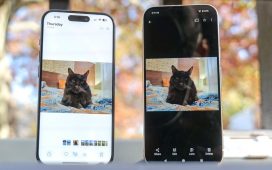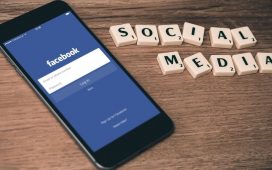
I remember standing in my waitress uniform in the midst of an Applebee’s restaurant in 2011, arguing with my coworker about getting a smartphone.
‘I refuse,’ I told her. ‘I don’t want to be addicted to my phone.’
I was in college and was already spending hours on my laptop scrolling through Facebook in between classes, and I didn’t want that kind of accessibility every minute of my life.
A year later, I finally broke down and bought my first Samsung smartphone.
In the decade since, my smartphone has become an extension of myself – and I bet you can relate.
It’s my timekeeper, journal, calendar and music player. I use it do my shopping list, read newspapers and listen to audio books.
I was recently writing about a new anti-tech movement that saw people ditch their smartphones and switch to so-called dumb phones, or cells that only do the basics.
And I thought it looked pretty liberating – so I decided I’d jump on the bandwagon and give it a go.
I bought a $50 Alcatel AT&T flip phone from Amazon with a $30 prepaid plan.
This one was the most appealing because of how inexpensive it was and it also had good reviews about the very basic features.
The phone included texting and calling, but no games – not even the iconic Snake.
I could take pictures with it, but of course they were nothing like the professional looking images my smartphone can capture.
Two days before I was due to switch over to my dumb phone, the unimaginable happened – my wallet was stolen and only by the grace of my smartphone was I notified in time that someone was charging my credit cards, allowing me to immediately freeze all of my accounts.

I bought a $50 Alcatel AT&T flip phone from Amazon with a $30 prepaid plan. This one was the most appealing because of how inexpensive it was and it also had good reviews about the very basic features
Well, the experience certainly didn’t quell my apprehension about giving up my constant access to the internet and I began to wonder if I had made a mistake by going back in time.
But I was immediately hit with a sense of nostalgia when it arrived in the mail.
‘Those were the days,’ I thought AS I connected the SIM card I had purchased which gave me unlimited talk and text.
I reminisced about my first flip phone I received at a time when it cost 10 cents to send or receive a text, phone calls to carriers outside Verizon were only free after 9 p.m.
And God forbid you open a browser by accident. That was normally followed with a panicked frenzy to shut it down before a significant charge appeared on your parent’s phone bill.
The phone had a key pad that was much larger than I remembered – until I realized it’s probably meant for older generations who don’t want to get on board with updated technology.
I was instantly transported to simpler times – but it didn’t take long for panic to set in.
Without being able to scroll on social media before bed or play Sudoku on my phone, I couldn’t get to sleep before midnight and often woke up at 2 a.m., nervous that I’d missed an important notification.
If you’re anything like me, conversations with friends and family are held across text message, WhatsApp, Instagram and Facebook messenger and I worried about not responding right away and missing out on pictures or videos of my nephews and events the girls in my book club were planning.
I sat with my laptop in the evenings before bed with WhatsApp and my social media platforms pulled up in front of me and was frustrated that during the day it took me 20 minutes out of my valuable one-hour lunch break to respond to four texts.
Embarrassment quickly set in when I journeyed to work on the bus and then the subway as I worried that people were judging me while I slowly typed out responses on what seemed to be a long-dead relic.

By the end of the first week I noticed something I hadn’t expected or anticipated – switching to a dumb phone was harming my relationships. I felt left out of all group chats and found I talked to my family and friends far less than I usually do
It dawned on me as I texted ‘What do you want for dinner?’ to my husband why me and my friends developed a kind of shorthand in my teen years.
It was because it took forever to type out the simplest sentences! Changing ‘be right back’ to ‘brb’ and even short words like ‘for’ to ‘4’ and ‘you’ to ‘u’ made so much more sense now.
Yet by day four it surprised me how quickly I had adapted to my new normalcy and began to actually enjoy it.
I started to accept that I wouldn’t see some messages right away and after experiencing a brief bout of stress about not having constant access to my emails, I began to enjoy that I could completely disconnect from work when I went home.
The quiet moments gave me more time to do chores around the house that would normally be neglected like spending the hour after I got home pulling weeds in the garden or hanging the mirror I had promised my husband I would put up when I bought it… six months ago.
While all of this might not sound surprising, by the end of the first week I noticed something I hadn’t expected or anticipated – switching to a dumb phone was harming my relationships.
I felt left out of all group chats and found I talked to my family and friends far less than I usually do.
But it wasn’t until my partner asked if I could please switch back to my smartphone because he felt we weren’t as connected when texting via my dumb phone, that I was forced to conclude the issue was me.
My responses had become slower and shorter than they usually would be, making for a stilted and awkward conversation.
Once this realization sunk in, I couldn’t enjoy even the smallest aspects of my newfound freedom from modern-day technology and started counting down the days to when this would all be over.
Being disconnected from social media lost its allure as I went to the beach and camping and was forced to upload photos to my laptop just to post, creating an unnecessary and time-consuming step.
I stopped posting in general which made me feel even more disconnected from my loved ones, but it was the incessant issue with texting that left me fatigued and wanting to toss this brick out of the nearest window.

After this two-week trial, my advice to anyone thinking about taking the dumb phone challenge as well – don’t do it unless the rest of the world will join you
As I neared the end of my two-week self-imposed sentence, my friend asked if she could solicit some advice from me.
My first reaction was, ‘Can I call you shortly to chat?’ but her response: ‘Text is better. I’m working late,’ left me weary, knowing it would take a minimum of 15 minutes to give her the response she deserved.
In the final days of using a smartphone, I dealt with the annoyance that I still couldn’t listen to my music in the car, resorting to the radio which had more commercials than I remembered it having in the days before Spotify.
Meeting a friend for dinner became a chore without the help of Google Maps, or a printer to use Map Quest like I used to, and I missed being a part of family and friend group chats that just didn’t work this phone.
Was there an upside to giving up my smartphone for two weeks, you might wonder? That’s a question I’m still trying to answer.
Aside from having a phone battery that lasts longer than a day, this was a journey I could have done without.
And after this two-week trial, my advice to anyone thinking about taking the dumb phone challenge as well – don’t do it unless the rest of the world will join you.









